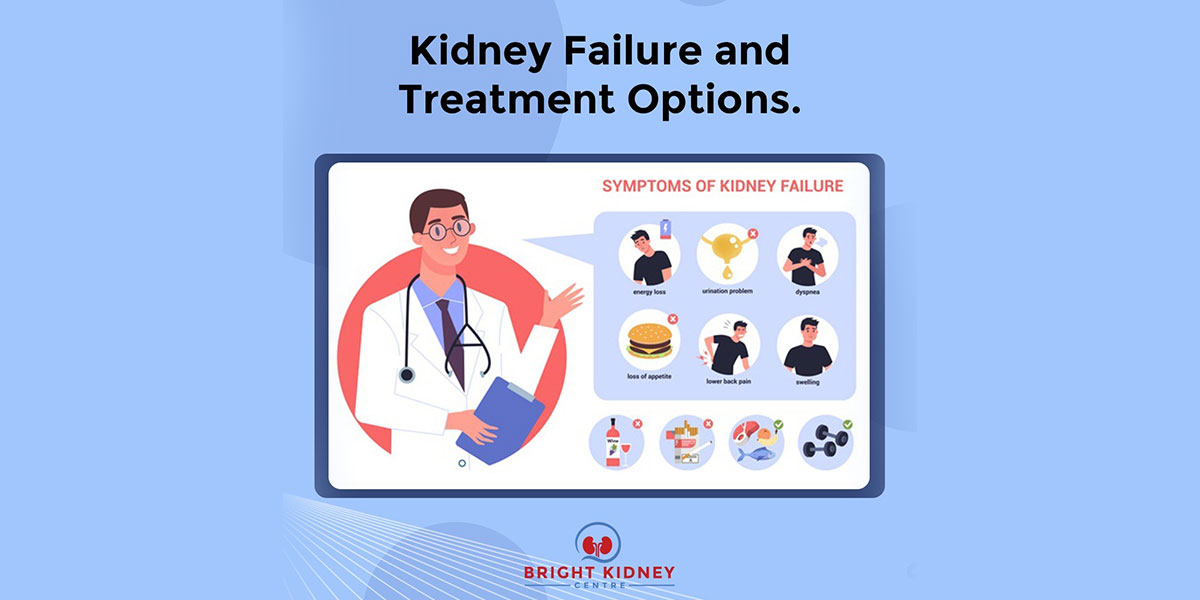The kidneys perform the task of waste removal from your body. They filter waste from your blood and expel it from the body through urine. Kidneys also play an important role in the maintenance of the body’s electrolyte and fluid balance. When the kidneys do not do their job, toxic waste builds up in the body and can make you really ill. Symptoms of kidney failure generally occur in late stages.
Symptoms
There are many symptoms of kidney failure such as:
- swelling of the hands, feet and face
- Consistent headaches
- Nausea/vomiting
- Weight loss
- Loss of appetite
- Breathlessness
- Reduced amount of urine
- fatigue and weakness
- Dry and itchy skin
Causes of kidney failure
Diabetes and high blood pressure are the two major causes responsible for kidney diseases.
Diabetes –Both Types 1 and 2 Diabetes can cause Kidney failure.
Longstanding, uncontrolled blood sugars can cause damage to many organs in the body, including the kidneys and heart, blood vessels, nerves and eyes.
Kidney disease is not common during the first 5 years of diabetes, it more commonly occurs 10-25 years after diagnosis of diabetes.
High blood pressure is also called as Hypertension, this condition is the second leading cause of kidney failure. In the course of time, chronic high blood pressure can make the arteries around the kidneys hard, narrow, or weak. The damaged blood vessels are unable to supply enough blood to the tissues of the kidney, depriving it of oxygen and nutrients. This eventually causes kidney failure.
Glomerulonephritis is a kind of disease that develops due to inflammation in tiny structures in kidney called glomeruli. The glomeruli are important structures that are responsible for removing extra fluid and waste from your bloodstream.
Other causes of kidney diseases:
- Hardening/Narrowing of the arteries
- Recurrent kidney infections
- Lupus
- Cancers
- Kidney stones
- Older age
- Long-term use of nonsteroidal anti-inflammatory drugs (NSAIDs) like asprin, ibuprofen
Early diagnosis of kidney disease and taking appropriate treatment is essential for preserving kidney functions
Diagnosis
A doctor will check for signs and ask the patient about symptoms. Diagnosis of kidney disease can be confirmed by
- Blood test -Tests are done to determine whether waste substances are being adequately filtered out.
- Urine test will help to find out if there is either blood or protein in the urine.
- Kidney scan–An ultrasound scan or Computed tomography scan
These scans reveal the size and shape of the Kidney and also check for any blockages in the urine flow
- Kidney biopsy, a small sample of kidney tissue is extracted and examined for cell damage. An analysis of kidney tissue makes it easier to make a precise diagnosis of kidney disease and guide treatment
- Chest X-ray is done to check for fluid retention in the lungs
Treatment
Dialysis: It is a procedure done to remove toxins and excess fluids from the blood and correct electrolyte problems when the kidneys cannot function properly. There are two types of dialysis- Hemodialysis and Peritoneal dialysis.
Hemodialysis: It is a procedure where a dialysis machine is used as an artificial kidney to remove toxins and excess fluid from blood.. The patient undergoes hemodialysis about 2 to 3 times per week. Each session lasts for at least 4 hours.
Peritoneal dialysis: It is a type of dialysis which uses the peritoneum, which is a layer that covers the intestines in a person’s abdomen. It acts as a membrane through which fluid and dissolved substances are exchanged with the blood
Kidney Transplant: A kidney transplant is a surgery done to replace a diseased kidney in a person with a healthy kidney from a living or deceased donor. When a kidney is used from a deceased donor, the procedure is called a cadaveric renal transplant.
Kidney transplant is an operation performed by transplant surgeons.
During procedure, an incision is made and a kidney transplant is placed in the lower abdomen. The artery and vein of the new kidney are joined to an artery and a vein in the pelvis. The ureter attached to the new kidney is joined to recipient’s bladder. The incisions are closed with sutures and a sterile dressing is applied.
If you are the donor, you can leave the hospital 2 to 4 days after surgery.
If you are the recipient and the kidney is functioning well, you are likely leave the hospital within a week. . But sometimes the new kidney does not work well right away, so you may need to stay in the hospital longer and you may need dialysis for a short time.
Bright Kidney Centre is one of best kidney specialist hospital in Hyderabad and they have the best nephrology doctor that handles all kinds of kidney patients. There primary focus is to achieve excellence in patient care through a better understanding of diseases. Visit the best kidney center in miyapur or book an appointment and get the best renal transplant treatment as Bright Kidney Centre is one of the best dialysis and renal transplant hospital in Hyderabad.

Leave a Reply